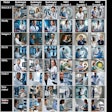Dear AuntMinnie Member,
Our top story of the week is a strange case from Florida, where imaging was used to detect a spinning toy lodged in the throat of an elderly woman.
The patient, an 83-year-old woman with dementia and an oral fixation, presented to the emergency department due to increased drowsiness and was admitted. Interpretation of the initial x-rays and CT scans by junior radiology residents failed to detect any problems.
But a new medical team noticed that the woman had noisy breathing. And after review of the initial images, the physicians discovered the 3-cm toy lodged in her hypopharynx; the toy was extracted via direct laryngoscopy and angled forceps. The case demonstrates the challenges presented by patients with dementia who ingest foreign objects, according to the group.
In other news, a recent study found that nonwhite children had lower rates of imaging exams when presenting to the emergency department than white kids. The researchers believe the findings could be indicative of race-based disparities in pediatric care.
Calif. RT dies after vaccine
Tragic news came from Southern California this week. A radiologic technologist (RT) at a hospital in Santa Ana died after receiving the second administration of the COVID-19 vaccine.
Tim Zook began experiencing symptoms a few hours after receiving the vaccine. He was hospitalized immediately but died after four days. Investigators are still looking into Zook's death and whether it was related to the vaccination.
Our thoughts and prayers go out to Zook and his family.
Mammography myths
The U.S. Preventive Services Task Force (USPSTF) last week opened up a review of its guidelines and recommendations on breast cancer screening, and it's already shaping up to be an epic struggle.
The focus is most likely to be on the group's controversial decision in 2009 to not recommend that women in their 40s undergo regular breast screening, instead suggesting that they should consult with their physicians. Many breast imaging specialists and women's health advocates have taken issue with that stance -- in fact, Dr. Matt Dyson believes the change led to the rise of numerous myths about mammography and its potential complications.
One radiologist who remains opposed to the USPSTF's 2009 decision is Dr. Daniel Kopans. A consistent proponent of breast screening, Kopans believes that there need to be fundamental changes to the way the task force reviews scientific evidence in order for mammography to get a fair hearing.
In other news, a new study proposes that breast screening should be discontinued for older breast cancer survivors with less than five years of life expectancy. And researchers from Massachusetts Institute of Technology developed an artificial intelligence algorithm that can estimate a woman's risk of breast cancer better than existing risk-prediction models.
Get these stories and more in our Women's Imaging Community.



















